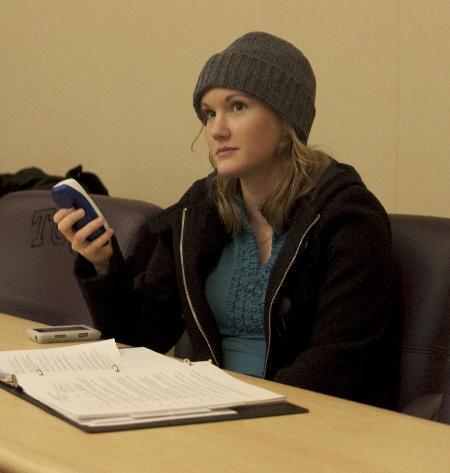The words ‘yea’ and ‘nay’ will no longer be heard echoing in the Brown-Lupton University Union Chambers when the Student Government Association’s House of Student Representatives gathers to vote on legislation. Thanks to new technology that was installed last month, a simple click will do.
The electronic voting system, including a laptop and wireless keypads, allows the House to record the representatives’ votes accurately and quickly, said Kim Turner, assistant director of Student Activities.
Lizzy Caudill, parliamentarian in the House and a junior political science major, said the House has assigned each representative a numbered keypad.
“For each piece of legislation, we vote on it via the clicker, so that way it appears on the screen,” Caudill said. “We can see statistics, we can see graphs and we also save those for our records to post online so the constituents can see how the representatives are voting for them.”
Merillat Pittman, speaker of the House and a senior political science major, said another benefit of the new voting system is the ability to know by how large or small of a margin a vote passed.
Pittman said the electronic system also added a professional element to procedure in the House.
“People feel the position is more legitimate when it is being tracked and when they are holding something that works so officially. I think it adds a little bit of importance to it,” Pittman said.
Caudill said the House also wanted the representatives to take voting more seriously and to be more conscious of their decisions.
Previously, voting took place orally, Turner said.
Before the implementation of the new voting system, Caudill said she did not have a way of tracking voters’ decisions.
“We had no way of knowing who exactly voted for or against (the legislation), it was just pure numbers,” Caudill said.
Turner said the new voting system eliminated the roll call and division votes that had to be taken if the vote could not be determined by oral consensus.
Pittman said the electronic voting system will also make voting more transparent.
“In the past, you were able to hide your voice amongst the majority and not really be noticed,” Pittman said. “Now … there’s no way to do that. We’re sure that every single person is voting and we’re sure of how they voted.”
The only changes in voting procedure include an increase in accuracy and accountability, Turner said.
“(The new voting system) does not change when we vote, it doesn’t change the choices people are given when they vote. It simply changes the way we record the vote,” Turner said.
She added that the electronic voting system had always been planned for the university union, but it just took a while to get the system up and running.
Pittman said the House webmaster, Christina Durano, planned to have the voting results of each meeting posted to the Student Government Association’s Web site by the end of the semester.
“We’re excited to experiment with (the new voting system) and think it’s going to really help us,” Pittman said.

